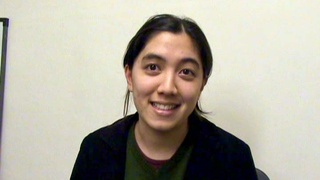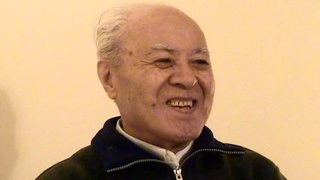Interviews
Losing his sister in camp
She got leukemia, a form of leukemia that uh she had to be hospitalized. And it took her a long time for her to die.
The hospital was outside of the camp proper, and uh where you had to go through a fence and guards to get... go to camp. So you couldn't visit. My mother was always there as I recall. And my father was there quite often. So we were left alone, most of the time. And it affected not me more than my younger sister because she never had a mother, you know. So, she blamed it on her sister for...being as a kid that is thinking terms of the jealousy factor, as competition.
But anyways she was um in hospital for a while. There's two things that they reckoned with prolonged her death was that uh she had a blood transfusion there. Just about everybody in that block gave blood, you know. And then the church was praying for her. That was the story I got. So the...my father told them, and mother said, I don't think...I think she's suffering too much so don't pray.
Well my mother never recovered. I'm sure she didn't. My father was um he was a real tough guy. In the sense that he knew what situation he was in. He never really showed this, saw this. He retained his dignity and his strength to not fall apart. And he kept saying now we must go on and all this kind of... You know, it was ganbatte. You know, he was really not um sort of you know in a state that he couldn't reorganize, keep the family together. He kept it together. I know it, I know I, he...he was quite upset...quite angry but it never showed He had to go along with the Japanese tradition. He had to be Nihonjin and not go into... you know fall apart.
So that was what... and then when my sister and broth..died... my..my sister died she was cremated. And then I understand a lot of them were buried too, right. But this is uh..my sister told me this the other day they were buried in a junkyard. You know? And uh in unmarked graves, you know, which they used to do in Germany, you know, with... with the victims, you know.
Date: June 29, 2012
Location: California, US
Interviewer: Chris Komai, John Esaki
Contributed by: Watase Media Arts Center, Japanese American National Museum
Explore More Videos

Living conditions in prison while serving time for resisting the draft
(b. 1925) Draft resister

Talking to children about decision to resist the draft during World War II
(b. 1925) Draft resister

Deciding whether to answer "yes-yes" on the loyalty questionnaire in order to leave camp
(b. 1925) Draft resister

Reflecting on Japanese Americans' response to incarceration
(b. 1925) Draft resister

Memories of railroad workers who stayed at family's prewar hotel in Spokane, Washington
(b. 1923) Chick sexer

Japanese American railroad workers are fired following the bombing of Pearl Harbor
(b. 1923) Chick sexer

A racist encounter at a movie theater following the bombing of Pearl Harbor
(b. 1923) Chick sexer

Encountering a train full of Japanese Americans being transported to a concentration camp
(b. 1923) Chick sexer

Growing up with Japanese language and values
(1925 - 2018) Nisei educator from Hawai‘i

Retaining Japanese customs (Spanish)
(b. 1950) Nisei Chilean, Businessman



Studying Japanese to understand her grandfather (Spanish)
Sansei Argentinean

The most memorable day of his life (Japanese)
(b. 1917) Okinawan, Issei Argentinean

